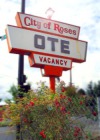
“We’re closed,” says the man behind the counter, without looking up from his receipts.
“But sir,” says the man at the door. “It was unlocked.”
“That would be because Mel went for coffee,” says the man behind the counter, “and Mel is a,” his fingers punch punch punch the keys of an adding machine, “thoughtless,” he says, at the rattling clack of calculation, “individual. Close it on up on your way out,” punch punch punch, “come back tomorrow,” clattering rap.
“But tomorrow is too late, and what I have in mind,” stepping in from the door, his bulky oaten sweater, his dull green cargo shorts, his boots anonymous beneath dried mud and dust, “it will only take a moment of your time, or mine,” his great big beard, his unbrushed head of hair, quite yellow, even in this sparse light, “or anyone else’s. Look, let me show you,” and he lifts a hand, closing it in a fist before him about nothing at all, and it’s as if every bulb in the shop has suddenly been overwhelmed, the flare from between his fingers striking brilliance from glass cases to either side, the phones and cameras lining the mirrored shelves within, and electronic devices more occult, the knives there, some sharply silver, some resolutely matte, and other bladed shapes and tactical accoutrements, the glittering glass tumblers there and silver flasks and lurid copper cups, the sparks and sheens from watchbands silver and gold, and all their crystal dials. That brightness, embering, falls, and his fist’s now filled with the hilt of a short but serviceable sword, the pommel of it heavily golden.
“Neat trick, son,” says the man behind the counter, “but, place like this? I got nine-one-one on speed dial.” His vein-rumpled hands do not stir on the counter, the one rested on the adding machine, the other moved to cover those receipts. The Harper Chillicoathe hastens toward him, “No, no,” he’s saying, turning the sword about to present that pommel first, setting it on the glass countertop between them, “I mean to trade it.”
The man behind the counter looks over the blade, then up to Chilli, his small square spectacles secured by a slender silver chain about his neck. “For what, exactly,” he says.
Chilli looks over, past the man behind the counter, to what’s racked back there, the shadowy file of shotguns, rifles, bullpups, long guns, there above the pistols and revolvers and handguns neatly lined on a middling canted shelf.
“Ah,” says the man behind the counter, the one hand lifting from those receipts, thumb circling his fingertips, “well, cash, credit, or trade, it’s a purchase, and as a purchase I have to run you through Ficus, which, this time of night, they won’t come back till the morning. And we’ll be needing some form of state-approved identification, fingerprints to be kept on file, all that pesky nonsense.”
“I was,” says Chilli, “hoping,” and a smiling shrug, his hands still there on the countertop, not reaching for any of the pockets of his shorts, the pads of his fingertips curled away, tucked protectively against his palms. “Hope,” says the man behind the counter, and a deeply reluctant breath taken in, let out, as those small square lenses turn back to the sword on the glass between Chilli’s hands, shortly sturdy, well-made, but well-used, the several nicks and dings and scrapes along the blade of it a-gleam in this depleted light. “I,” he says, “couldn’t do better than one, one twenty for this. You got a ways to go yet, for that.”
Chilli lifts a hand, fingers rounding into another fist. “I have another sword,” he says.




